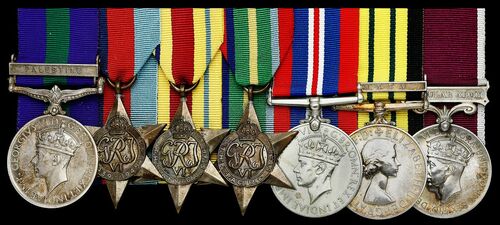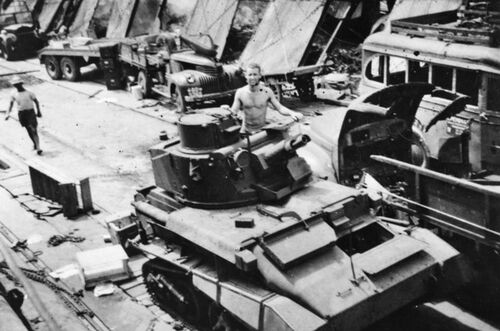Auction: 23112 - Orders, Decorations and Medals - e-Auction
Lot: 589
(x) A 'Dutch Java Prisoner of War 1943' group of seven awarded to Sergeant W. G. Colyer, a pre-war regular soldier who saw action in North Africa with the 8th Hussars before joining the 3rd Hussars in the Dutch colony of Java and ending the war as a P.O.W., finally seeing post-war service with the Royal Armoured Corps
General Service Medal 1918-62, 1 clasp, Palestine (552261 Tpr. W. G. Colyer. 8-H.); 1939-45 Star; Africa Star; Pacific Star; War Medal 1939-45; Africa General Service 1902-62, 1 clasp, Kenya (552261 Sgt. W. G. Colyer. R.A.C.); Army L.S. & G.C., Regular Army (552261 Sgt. W. G. Colyer. 3rd H.), minor wear, overall very fine (7)
One of only 145 men of 'B' Squadron, 3rd Hussars to see service in the East.
William George Colyer was born at Neston, Cheshire on 13 July 1913 and was serving as a Trooper with the 8th Hussars during the Arab Revolt of 1936-39 before transferring to the 3rd Hussars. With them he joined the Second World War in France before being transported to North Africa. With the Japanese offensive in Malaya gaining pace the British found themselves opposed by a large number of Light Tanks, something which was considered impossible according to their own tactical doctrine.
To combat this a single squadron of light tanks from the 3rd Hussars were ordered to embark for Singapore. 'B' Squadron was chosen and in early 1941 they got underway, unfortunately they were not able to reach the city before its fall. Instead they were re-directed to Dutch Sumatra, arriving in Sumatra as the Japanese began their invasion of the island.
A series of contradictory orders resulted in the unit leaving for Java only a week later having been unable to load much of their equipment. Arriving in Java they went into action alongside Dutch and Australian troops near Bandung however by 6 March the Dutch government was prepared to capitulate. The Hussars were ordered to destroy their tanks, a task they accomplished by pushing them into a ravine, before making for the coast.
They were unsuccessful, largely thanks to the efficiency with which the Dutch had destroyed the boats on the coastline to prevent their use by the Japanese. Colyer went 'in the bag' with the others on 8 March 1942, although their loss was only reported on 1 February 1943. He was held at the Hiroshima Prison Camp until the end of the war, being lucky to survive his ordeal with 54 of the 145 men of 'B' Squadron dying in captivity.
Colyer was repatriated on 2 September 1945 returning to his wife Clara at 14 Chester Road, Neston. Remaining with the Military after the end of hostilities he was promoted Sergeant and joined the Royal Armoured Corps, seeing service during the Mau Mau uprising in Kenya.
Subject to 5% tax on Hammer Price in addition to 20% VAT on Buyer’s Premium.
Sold for
£1,500
Starting price
£200







